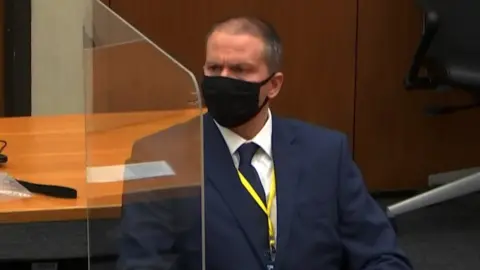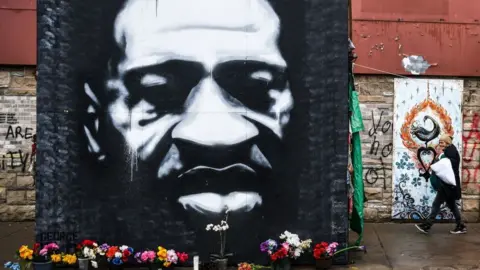George Floyd: Third-degree murder charge against Chauvin reinstated
 CBS
CBSA third-degree murder charge has been added against ex-Minneapolis police officer Derek Chauvin for the alleged killing of George Floyd.
Mr Chauvin has already been charged with second-degree murder. Experts say the new charge is easier to prove in court, but carries a lesser penalty.
Mr Chauvin has pleaded not guilty. His trial jury is currently being selected.
He is accused of kneeling on Mr Floyd's neck for over eight minutes in an encounter that sparked global protests.
The decision on whether the new murder charge would be added caused a delay in the trial earlier this week.
Mr Chauvin is also accused of second-degree unintentional murder and manslaughter in the 25 May 2020 death of Mr Floyd. The maximum sentence he could face is 40 years.
The less severe charge of third-degree murder was initially dismissed last year, but prosecutors requested to reinstate it.
According to Minnesota state law, the maximum penalty for third-degree murder is 25 years.
Why was the charged added?
Hennepin County District Court Judge Peter Cahill's decision came after he initially ruled in October that third-degree murder was not appropriate.
State prosecutors asked the Court of Appeals to intervene. Last week, they ordered the judge to reconsider the charge.
The three judge panel ruled that Judge Cahill did not correctly apply precedent set in the trial of Mohamed Noor, the former Minneapolis officer who fatally shot an Australian woman who had called police in 2017.
 Getty Images
Getty ImagesMr Chauvin's defence lawyer's asked the state's Supreme Court to decide the issue, but on Wednesday the panel elected not to take up the case, effectively passing the decision back to Judge Cahill.
To prove second-degree murder, prosecutors must convince jurors that a serious assault had been committed by Mr Chauvin, and that it was a "substantial causal factor" in Mr Floyd's death.
Third-degree murder requires prosecutors to prove that Mr Chauvin showed a reckless disregard for human life, but not prove that an assault led to the death.
So far six jurors have been selected for the closely-watched trial.
Five are men and one is a woman.
What happened to George Floyd?
The 46-year-old was arrested on suspicion of using a counterfeit bill.
He was handcuffed, but when officers tried to put him into the squad car he resisted and a struggle ended with Mr Floyd face down on the street.
Mr Chauvin, 44, kneeled on Mr Floyd's back and neck for eight minutes and 46 seconds, according to prosecutors. Three other officers assisted Mr Chauvin in the arrest.
Mr Floyd said he could not breathe more than 20 times. The video shows him go limp and get carried away by police.
He was pronounced dead in hospital an hour later.
